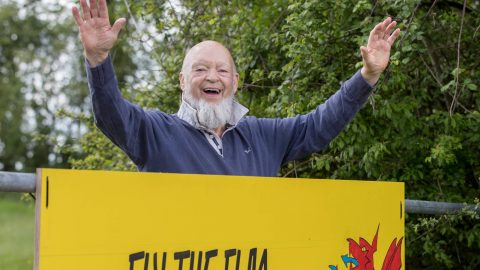NME Music News, Reviews, Videos, Galleries, Tickets and Blogs | NME.COM

“Writing songs is a kind of exorcism,” says Kate Stables, the creative whirlwind behind alt-folk act, This Is the Kit. Rising to fame while working with the likes of PJ Harvey collaborator John Parish and The National‘s Aaron Dessner (as well as singing on their last album ‘I Am Easy To Find‘ and the subsequent tour), now This Is The Kit return with their most direct and affecting work to date.
We caught up with Stables to talk about what went into their fifth album ‘Off Off On’ – which finds her confronting anxiety, mortality and environmental collapse in songs of characteristically jagged beauty.
“It was nice to have certain ideas challenged with this album,” she tells us. “It’s good to make friends with your demons.”
Hello Kate. You’ve talked about these new songs ‘swinging between good places and bad places, inside and out’. What do you mean by that?
Kate Stables: “I think, as humans, that’s what we do. Sometimes you can feel really positive about the way humanity is going, and then other times not at all. It’s also to do with how we choose to spend our time and energy, how we choose to look at things, and how we choose to be helpful or not – in our own lives, and also in society. It’s this eternal balance between negative and positive. That’s what we’re all battling with.”
You mention society. In a recent livestream, you changed the title of ‘Easy on the Thieves’ to ‘It Is the Government’s Responsibility to Fund the National Healthcare System’…
“Yeah, it’s a bit of a longer, less punchy title…”
Do you feel that artists have a responsibility to be political, especially at the moment?
I”t’s a hard one, because some people would argue that it’s an abuse of your situation to talk about politics. And others would say it’s your responsibility to set an example and not encourage this taboo attitude of, ‘Oh we won’t mention that, because Uncle Colin votes Tory’. But when you feel like there’s a group of people doing so much damage to a country, and to establishments within that country, and to people who live in that country – it feels really irresponsible not to speak out about it. I don’t feel that I can be myself without talking about things that I think need talking about.”
Your lyrics are quite abstract. Is that a protective layer – because you don’t want to divulge specifics – or just how you naturally express yourself?
“I think it’s how I naturally express myself. Anyone who’s ever asked me to write something that isn’t a song – anyone who’s ever received a letter or an email from me – knows that I’m not a tidy writer, it’s lists of words and gobbledegook. But there is an element of privacy. I think a songwriter shouldn’t have to explain themselves or explain their songs. I just like being left to interpret a song, and I like leaving people to interpret my songs.”
You’ve cited [American sci-fi and fantasy author] Ursula Le Guin as an influence on this album…
“Yeah, I think she just always influences everything I do – even just how I make a cup of tea. I’ve never read one of her books where it hasn’t set off little explosions in my brain of the possibilities in the world, and also a way of being, and of appreciating life. She’s such a skilled writer, and the way she writes is such a pleasure.”
‘This Is What You Did’ mirrors the circularity of an anxiety attack. What can you tell us about that track?
“‘Why am I putting everyone through the stressful experience of listening to this song?’ For a lot of people – me included – writing songs is a kind of exorcism. You say things out loud to get them said and out of the way, and then they almost don’t exist anymore. It breaks whatever power they had over you. So that song is about looking at the voices you hear and trying to work out how much of it is other people’s judgements, and how much is our own negativity. Anxiety is a circular thing – there is that vortex we can get trapped in sometimes – and the song has these loops that mirror the mind-loops in the words.”
The title track deals with the death of a friend…
“Yes, in part it’s about this experience in a hospital and the idea of someone leaving and how we come to terms with that – putting ourselves in that position: what it would be like to know you’re on your way out. And the rhythms and the routines that happen in and out of a hospital room, and the light that changes, and the daily cycles of being in this one place. Places or images are often my inspiration for songs. For me, I just see this particular hospital, and the kind of light in it, and the bulbs that blink on the machinery.”
Was it important that ‘Keep Going’ ended the album on a resilient note?
“Yes – I wanted it to be positive. The record is kind of a transition from a place of unrest to a place of peace of mind or hopefulness or perseverance. This idea that we can keep going, we’ve always kept going, and we can still keep going. And it is going to get better. I hope that is true.”
‘Off Off’ On is out now on Rough Trade Records.
The post This Is The Kit on representing anxiety and speaking out against “those doing damage to the country” appeared first on NME Music News, Reviews, Videos, Galleries, Tickets and Blogs | NME.COM.





